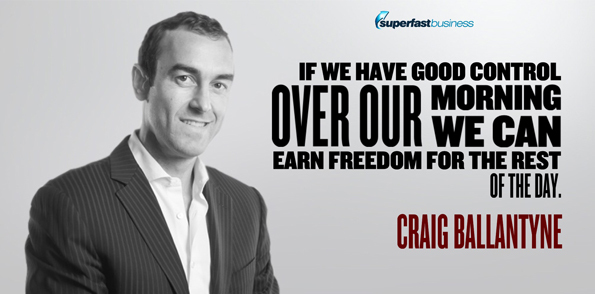Podcast: Download (Duration: 34:20 — 31.6MB)
Get Notified Of Future Episodes Apple Podcasts | Spotify | Amazon Music | Android | Blubrry | Gaana | TuneIn | Deezer | Anghami | RSS | More
In the interview:
01:32 – The story behind the book
03:39 – A self-prescription
05:15 – The 3C formula
07:43 – Is it possible for parents?
11:05 – Well-structured days
13:08 – A vote for Netflix and gaming
15:32 – Audio is big
16:22 – That magic time
18:24 – Why Warren Buffett is successful
20:17 – A formula for great sleep
22:20 – Are you reactive or proactive?
24:00 – More on sleep
25:40 – Know where you want to go
27:09 – How important is wealth?
29:54 – Teaching is learning
32:10 – One thing you should do tomorrow morning
Get more ideas to improve your business and your life inside SuperFastBusiness membership

Transcription:
James: James Schramko here, welcome back to SuperFastBusiness.com. Today, we’re going to be talking about the perfect day formula, with Craig Ballantyne. Welcome to the call.
Craig Ballantyne: Hey, James, good to speak with you again.
James: You know, we did an audio podcast many, many years ago when you were running around with a fit body, and I assume you still have a fit body.
Craig: Yeah. It’s an older one.
James: You started this movement called turbulence training, and I think the whole idea was that you could do exercise in short impact bursts and you didn’t really need a lot of equipment, which is pretty mind-blowing, when you think about it.
Craig: Yeah, it’s a lot different from the way most people think, but as you know, James, it’s all about thinking different in order to get ahead.
James: Yeah, and you’ve gone on and you’ve had a lot of success in your own business, you are now the chief editor of Early To Rise, you’ve been doing that for a while, and influencing a lot of people with your thoughts, especially around wealth and health, and those type of topics, and you’ve now just published a book, and I think a kit, called The Perfect Day Formula, and that’s what we’re going to talk about today.
Craig: Yeah, it’s going to be good.
Why the book?
James: So why did you decide to do a book?
Craig: Well, it’s something that I’ve been working on for a long time, so it’s funny, we were just speaking about how quickly you read through it, but the book that I actually submitted to my editor was 300 pages, and then he sent me back something that was 110, so he really cut out a ton of stuff.
I spent way too long working on it, but it’s really a combination of everything that I’ve learned and applied to my life, everything that has helped me become more productive and successful, and everything that I see a lot of people struggling with. And what I wanted to do was show people how to get more out of their day, how to overcome that feeling of anxiety that they have at the end of a day when they feel like a day has disappeared from them without getting ahead. And so we’ve really focused it on that and put together these 3 little secrets that are in the book, that help you with your morning, your afternoon and your evening so that you just really can live the life of your dreams, which I believe most people can.
James: Right. And you believe that most people aren’t at the moment?
Craig: Oh, I think a lot of people have a lot of frustrations with what’s going on right now. They really feel like they’re spinning their wheels, and I like to use this analogy, where you’re right beside the road to success, and you see these people who you know aren’t smarter than you, and who aren’t working as hard as you, but for some reason, they’re turning up with all the buyers in your industry or they’re turning up with all the social media interest or whatever it is you’re competing for, and you’re just spinning your wheels right beside, and then I just come along and I lift up the back bumper like a grandma, super strong grandma who lifts the car off her grandkid or something, and I just put the wheels over on the road of success, and all of a sudden, whoosh! You know, you just take off.
And so that’s what the book is built for, to help people who are working hard, who are doing all the right things they think, but just aren’t getting ahead, and it comes down to these 3 components that they’re missing in their life, and once they get those, again, whoosh, they’re off on the road of success.
Valuable lessons gained from anxiety and panic attacks
James: Right. So the subtitle is How To Own The Day And Control Your Life, and you basically built this book out of self-prescription. You actually suffered anxiety.
Craig: I did, yeah. I mean, it was not just like, “Oh, I feel kind of anxious,” it was like, “I’m going to the hospital.” I went to the hospital twice, and one time, it was back in 2006, so I was part-time trainer, part-time online business owner, and in one of the training sessions, I asked one of my clients, he was 5’3, 310 pounds, obese lawyer, and I looked at him, and I said, “I need you (you know, the obese guy) to take me to the hospital, because I think I’m having a heart attack, and I just can’t deal with this.”
And so it was anxiety and panic attacks, and so I did a whole bunch of things to overcome it. Nothing was the one thing that saved me, but there was a whole bunch of things that I tried, and it was just never ever giving up on getting rid of it. And eventually I did overcome it, and I’m able to fight it off every time I feel the anxiety coming back. So it was a real learning experience, and it put a lot of lessons into the book, not necessarily to help people overcome anxiety, but to help them overcome whatever it is that they’re struggling with.
James: Right. So I read through the whole book, I took a few notes, and I was wondering if it’d be OK to discuss a couple of the ideas in it.
Craig: Yeah, I’d love to.
James: Epictetus. I don’t know how you pronounce that. But that’s where the…
Craig: E-pik-tee-dus. Epictetus is his name.
James: Epictetus. It was basically about not worrying about things that you can’t influence, and I think you were saying that he’s to do with the Stoic movement.
Life rules
Craig: Yeah, so really, one the books that’s had a great influence on my life is this little book that’s a translation of his teachings, and it’s called The Art Of Living, it’s written by Sharon Lebell, and this book has had a huge, huge impact on me. I read a page a day, I go through it three to four times a year, and it’s almost like my version of a horoscope, and it really speaks to me. And so one of the main lessons that I got from this Stoic philosopher Epictetus was: control what you can, cope with what you can’t, and concentrate on what counts. And I call that the 3C formula, and then I applied that to our days.
So you control the morning, we have the most control over our mornings. When we get up, what we do, what we have for breakfast, what we focus on for the first 15 to 90 minutes. You know, what time we get to work. So we have control, and if we have good control over our morning, we can earn freedom later on in the day.
Cope
The second part is, you know, cope with what you can’t control, and so that means, you can show up to work, and if the boss is in a bad mood, you can’t control that. You can’t control if there’s going to be traffic, you can’t control if it’s going to rain. You can’t control if your spouse or partner is going to be having a bad day of their own and coming home in a bad mood, and not wanting to cook dinner, or take care of the kids. You can’t control that, but you can cope with it by controlling your own reaction to it. And so that’s really removed a lot of stress from my life, when I realize, hey, I don’t have to get angry because somebody else is angry. I can control my reaction to this and work through a better resolution.
Concentrate
So that was the second part, and then concentrate on what counts at night, so that was the freedom in the evening. We want to focus on that, because that’s what we’re doing all of this stuff for. When you use to work back in Mercedes-Benz, I can’t remember if you had a long commute or not, but you were working a long day and then coming home and working on your internet business, and you could control that because you had this vision of your future which you achieved, and now you have a really great system in place. And you were doing all that work for your family, and that’s what we’re all doing, we’re doing all the work that we do for our family, and for our health and for our hobbies, and so when we have a nice vision in place, it really allows us to get to exactly where we want to go in life.
Does it work for a busy parent?
James: Yeah, I thought that was interesting, when I looked at your daily schedule, there was only like, family only came into it at like 5 o’clock, for a couple of hours.
Craig: Well yeah, I don’t have any kids, so I don’t have to get up and take them to school.
James: That’s what I realized. As soon as I read that, I’m like, OK. Craig doesn’t have kids. Is this book still relevant for anyone who has a family?
Craig: Well, certainly, yes. So one of my best success stories is a pediatric anesthesiologist. I always get that wrong, I always say it wrong. So she is a pediatric anesthesiologist, so she works from 7 a.m. to 6 p.m., but she also wants to be a writer, and she has two kids and lives in California in a very expensive part of the country. And so here’s what she does: she gets up at 4 in the morning, and she writes for an hour, and then she does my little 4-minute workouts, and then she gets her kids off to school, and then she goes to work from 7 a.m. to 6 p.m., comes home, has dinner with her family, reads to her children, and then spends time with her husband.
My business partner Matt Smith, who is on that trip in Arizona with us, he has two kids, he does the same. He gets up early in the morning, he focuses on his number one priority first thing in the morning, gets the kids off to school, get to work, works, goes home, gets the kids after school, takes care of them. One of the cool things that he does is that he has days when they’re not allowed any devices, and so I encouraged families to have device-free days, which means no iPads, no iPhones, no televisions, I mean it really opens up creativity to the children again. And so he does that some days, and then he’s in bed on time and he’s running a couple of big businesses. And so yeah, of course it works for everybody with kids or no kids.
I look back on the way that my parents spent their time, and if they struggled with anything, it’s because they didn’t use their time right. They still spent time with me and my sister, but they watched a lot of television and so today we see a lot of people binge-watching these TV shows. And that’s fine, but it’s something that I think most people end up regretting, if not now, at least 5 years in the future. It’s like, when I was a kid, I played a lot of video games, but I don’t, I mean, I regret most of the time I spent playing video games because it was like, mindless calories.
Better structure to your day = more freedom in your life
Craig: You want to make the most of your time, and that’s what we’re showing you to do here in the book, is just giving you the structure so that you have more freedom in your life, so that you come home at the end of the day and you have all that time to be with your children.
So one last thing, James, is I was in a park recently, walking round the park, and I saw a kid playing with his dad, and the kid was kicking a soccer ball and the dad was looking at his phone, for the entire time that I watched him. And every time the kid would kick the ball, the father would walk over to the ball, kick it back to him, but not even look up from the phone. And every time the kid kicked the ball, it was just like the momentum was going out of the kid and the motivation, and it probably ruined a great Saturday morning with his father, because the father didn’t look up from the phone once.
Why the father was looking at the phone, I don’t know, but I remember when I was a kid, when my dad and I would play catch, I mean it was just me and my father playing catch. Now there was no phones back then, but my father would never have done that to me, and therefore I can look back on those times as being wonderful, great memories, because it was my dad, me just playing catch, and nothing else, and he was paying attention to me.
Making the most of time
And so that’s what we do. We structure these days so well, so that we have that great routine, just like you have a great routine so that you get so much done, that you can pick up your kids after school, you can help them with their Math at night, you can read to them, you can have dinner with them. Sheryl Sandberg from Facebook is one of the most impressive people that I know, I was very skeptical of her, I don’t know her, sorry, but I read her book, Lean In, and I was very skeptical. I didn’t think I’d like it or learn from it, but I loved the fact that she was able to get home and spend dinner with her family. Unfortunately, her husband passed away in a tragic accident, but they got home every day, spent time with the kids for dinner, and then they went back and worked in her home office.
You may have too many responsibilities, but still, try to be home for dinner
But being at home with your kids for dinner is the number one research-proven way to raise well-adjusted kids. And so if you have a well-structured day, you can get home for dinner, and you can do the best you can to raise well-adjusted kids. So it’s so important, it doesn’t matter how busy you are, there’s a way that you can do it.
James: Right. There’s a few points on there, you’ve just delivered. I can certainly relate to a lot of what you’re saying. As a parent of four kids, I reckon there’s two phases of my life. There’s the phase where I was working hard, overworking, and then there’s the phase now where I’ve got things all together.
But I think a lot has to do with the type of business model or the type of work you do. There was a definite shift between when I went off to an office every day, which is what you sort of talk about in the book, and I accept that most people reading the book will be in that scenario, where they still go off to an office and they work Monday to Friday. And I got no idea why society is like that, it just doesn’t make any sense to me. And then there’s the time when I didn’t go to an office, when I have my own business and basically, you can build your life the way you want, and the business can fit in around that and I’m literally down to the tide charts now, but I think a lot has to do with the type of work you do.
Could your usual routine of Netflix and gaming really be that bad?
I definitely would take a different point of view on you regarding gaming and even Netflix. Years ago, I used to consider the same as you, people sitting there on their couch, eating junk food, getting fat, watching mindless sitcoms. I get that. It does seem ridiculous. But I have got a lot of value from gaming, and I’ve seen even with my kids how it encourages them to go to the next level, to explore, to be challenged, to develop their competitive streaks, and I think gaming pretty much saved me from a lot of stress during my sales career. To come home and unleash a bit of Gran Turismo was a great way to ease out of my heavy mind load, which sort of fits in with some of your night time patterns.
But also with Netflix, I think in jobs like yours and mine, where you are being creative and writing and storytelling, it’s really a masterclass in storytelling if you pay attention to those stories and why they keep us coming back, and how they develop the characters, and which one’s a popular society. I think they’re super instructional and I’ve even had my own audience say to me that I’m a little bit lighter now, I’m a little bit funnier, I’m a little more vulnerable. But I think some of that came from letting go of the guilt of watching a Netflix-type series and just enjoying it, and absorbing the thing. And I would probably watch a show each day now, but it’s not that I’m grinding out for 10 hours doing other work, which is the important point there. And so, it’s a shift.
So, I don’t know what you think about that.
Craig: Well, I mean, you know, you can read books, you can watch great movies, it’s all about quality though, isn’t it? I mean, if you’re watching junk just to watch junk or if you’re watching stuff because you don’t want to be left out at work in the conversations, that’s not a great reason to do it, but certainly, the storytelling in Game of Thrones, I mean it’s second to none in terms of television. Maybe you get the same from reading the book. It’s all good creativity fodder, as you mentioned, but you don’t necessarily have to watch TV and you don’t necessarily have to read books to be successful. It really depends on a lot of things.
Audio is in
James: A lot of our peer group actually listen to books, don’t they?
Craig: Yeah. It’s funny, with the book that we’re talking about, that I wrote, twice as many people have bought the audiobook compared to the Kindle and hardcopy combined.
James: Got you.
Craig: Because it’s so convenient, right? You can be hands-free, listening to the audiobook while you exercise, while you wash the dishes, while you drive your car, while you do your laundry. You know, I even put all of my webinars on audio now, and a lot of my coaching clients prefer that just for the same reason. You can do it and listen to it and study it without having to have your hands working at the same time.
James: Look, the whole point here is recognizing your modality that gets you the best results and seeking out information in that modality. For the same reason, we transcribe every single podcast on this show.
Can you have it all? Can you have the perfect life?
Something else I thought was interesting. There’s a lot of stuff I really do agree with, too, by the way. I absolutely agree with the best work is in the morning, especially when your willpower’s the strongest. Hundred percent agree. I also agreed with the point you made about, that you could get, I think you said three times more done in the same hour, in that period.
Craig: Yeah, in that magic time.
James: Yeah, so there’s magic time. That’s really consistent with other things I’ve read. One of the things that wasn’t was it says that, “You know you can have it all.” But some of the other books I’ve read, I think like Essentialism, for example, they sort of suggest, well you know what, you really can’t have it all so you should just decide what is important to you, and just settle for that. What are your thoughts on that?
Craig: Well, I mean, you’re not going to be the King of England, so you can’t have it all.
James: (Laughs) Because you sort of touched on that in the very end. I liked the start of the book much more, because by the end, you’re starting to tell me what I can and can’t have in my vision, which I thought was interesting, because you’re looking through your lens, so I think this book is going to be most suited to someone who has an office job, and no kids, to start with.
5 Cokes a day
What about Warren Buffett and drinking five Coca-Colas each day?
Craig: Man, that guy’s diet is something. I think he eats Dairy Queen for breakfast.
James: And has a big steak dinner. As a fitness coach, how did you feel when you were compiling that research?
Craig: You know, it’s incredible what the human body can adapt to. On one hand, the human body is so fragile, you know, you hear about a guy who’s 35 years old who has an aneurysm. An otherwise healthy guy, taking his kids to Little League and he has an aneurysm on the side of the ball field. You know, like wow, the human body’s just so fragile. And then you take a look at somebody who is obese and smokes cigarettes, and they’re 65 or 70 years old, and you’re like, wow, the human body is so resilient. And then it’s just a matter of the fact that there’s 7 billion people, so you’re going to see extremes at both ends.
Introspection makes a huge difference
But you know, Warren has built his life, kind of like you, he’s built his life around exactly what he knows he’s best at, and he’s become so successful because he focuses. He’s a non-electronics guy, and he just reads all day. He’s an old school, well, an old man, he’s 80-something now. But you know, very intelligent person. And probably the most important thing that we can learn from him is that he has spent the time in introspection learning what’s best for himself. So have you, and that’s how you’ve become so successful, and that’s how most people become successful, because they just sit down and give themselves a bit of clarity and thinking and say, OK, here’s my best time for working, I’m going to protect this, and I’m going to focus my number one priority on it.
James: I love that.
Craig: Yeah. Most people just never do that.
James: He avoids meetings, he’s mostly reading and thinking. Totally agree. I know you’ve taken up meditation, you’ve built in time for thinking. I think a lot of us have not yet discovered that we don’t really need that much from outside, a lot of it’s inside. Our inner game is the most important thing, and you’ve really touched on it when you said, control. Recognize what you can control, you can control your beliefs. We’ve touched on similar topics in recent episodes with Seth Ellsworth, where you can change your beliefs, and then you can change your outcomes. I have a whole podcast on that entire topic, called Think Act Get, the way you think determines how you act, which results in what you get.
But taking responsibility and having discipline, they seem to be themes that came through in your book, and I would expect that from someone who’s proven it in the human body form, with your background in men’s health and fitness. You’ve seen how you can apply the same principles to your muscle.
Craig’s advice on how to get better sleep
But one of the most interesting things to me, and one of the least talked-about things out there in business is sleep. And I’ve spoken to sleep coaches, I’ve read lots of documents, and they all say exactly what you said. Lay off the caffeine, lay off the alcohol, turn off the devices. And you had a 10-3-2-1-0 bedtime routine, which I thought was fantastic, and that would be highlighted and double underlined if I was giving this book to someone. This is very important information, and it’s not really discussed very much in an environment where workaholism is kind of celebrated as some bravado thing or some hero thing to do.
Craig: Yeah, I mean it’s funny that you point that one out, because that actually got picked up by a whole bunch of newspapers, it was actually on Telegraph’s website and it was on Inc. magazine’s website and it sent a ton of traffic to our website because they excerpted that chapter from the book. And then I would read the comments to all the articles on those websites, and it was just excuse after excuse after excuse after excuse about how they couldn’t do that, about how I’m living in a fantasy world.
A short not to do list
But it is pretty simple. It’s just 10 hours before bed, you should stop drinking caffeine, because research shows over and over again that caffeine will impair your sleep, and even if it doesn’t impair you falling asleep, it impairs your sleep cycles. And then the next thing is try not to drink alcohol within 3 hours before bedtime. Of course, that means that you just drink it in the afternoon, but that’s OK too. And then, 2 hours before bed you should stop eating big meals, and so I try and stop eating 2 hours before bed. And then 1 hour before bed, it’s turning off the electronics and the blue lights and all the screens and you know, going dark, I guess you would say, and you know, you spend that time chatting with your spouse, playing with your kids, giving them a bath, and making your lunch for the next day or reading a book, you know, an old-school book.
Reactive vs. proactive
And so, it’s really just winding down the day. And so it comes down to are you going to control your life or are you going to be reactive and say, “Oh, I got to go watch you know, this TV show now,” or “I have to go and watch this sporting event, and if I don’t, then I’m going to feel out of place tomorrow at work when people are talking about what I missed last night.” And so, I think that’s a lot of it for most people, it’s either be reactive or be proactive. And if you’re proactive, you’re going to succeed in life, if you’re reactive, you’re always going to be chasing the world and you’re always going to feel frustrated and never being able to catch up and get ahead.
James: Well, I think for most people the simple action step would be just to remove the social media icons from your phone. That is really the curse of society, I’ve been banging on about it in God knows how many episodes. But the parent, looking at their phone while the kid’s kicking the soccer ball around? That’s just sad.
And the same if you go to a coffee shop or if you catch any public transport or even just walking along the… I live in one of the world’s most beautiful beaches here, and people are cruising up and down the esplanade staring at their screen. You know, mostly tourists I might add. The locals here, they’re all up and active and running and walking and swimming and they’re out and about. And like you said, with your kids, do analog activities. I take my kid motocrossing and surfing, and they play guitar, and like real things that we used to do before the internet. I hope that’s not lost in future societies.
Craig: With virtual reality, James, who knows?
More sleep tips
James: The sleep coach that I had on said alcohol is like the number one culprit for bad sleep. People think it’s going to put you to sleep, but it just messes with you.
Craig: Right, it’s like a double-edged sword, it’s like, “Oh, if I just have a drink, I’ll relax and be able to fall asleep,” but then you don’t get into the deep sleep cycle, so it’s really bad. And you know, I fly a lot, and so when I see people having a drink before an overnight flight, I’m just like, “OK, you’re going to wake up really tired tomorrow and blame it on jet lag, but if you had just gone to sleep without the alcohol in the airplane, you would have slept a lot better.”
There’s those tips, and I highly recommend looking silly when you go to bed, and what I mean by that is putting one a sleep mask and wearing earplugs and since I’ve started doing this, I’ve just started sleeping so much better. Because it’s pretty difficult to have a dark room all the time, especially with all the hotels that I stay in and all the mystery lights that they have in hotels. But you slip on a really good quality eye mask, and you can’t see anything, and having that darkness is really, really important.
James: Yeah. I’ve made sleep a huge priority in my life, and life’s so much better. I actually think I went through at least two decades of not having proper sleep, and I made bad decisions and was unhealthy and unhappy. And just changed it all. In fact, the number one thing that changed my life was surfing, because I was genuinely tired at night. I look forward to it the next day, so I had great dreams of it, and it’s just an engaging, soulful, analog activity, so you get off the devices and stuff.
The importance of looking ahead
So building that into my routine was the biggest things, and fits with something that you mentioned here, which is very powerful and reminded me of Dan Sullivan type of quote, but it’s “What do you want your business to look like in 5 years?” So you could apply that to life. What do you want your life to look like in 5 years? I think actually thinking about what your vision might look like was a big key point for you, and it certainly was for me, and I’m sure it’s good advice for anybody.
Craig: Yeah, because I think once you have a really clear picture in your mind, that’s the only time that you can then say, OK, now I know how I’m going to get there. Now I know what the right activities are. And so again, it goes back to having the time to actually think about something. You know, Dan Kennedy is a big marketing expert, and he once was talking to Lee Iacocca, who used to run Chrysler, the car company in America. And you know, Lee Iacocca, one of the most powerful CEOs in America said he had less than 15 minutes a day to think, because he was so busy with all these other meetings and stuff. And so that’s the way most people are. If most people could even get 15 minutes, I would be surprised.
 But if you sit back, you think and you ask yourself the right questions, or if you just read the book and let me ask you the right questions, you can then get a really clear picture of where you want to go. And just like having a map, now you know exactly what road to take, you know exactly what tools you need to get there, and it becomes much easier for you to succeed in life when you know where you want to get to.
But if you sit back, you think and you ask yourself the right questions, or if you just read the book and let me ask you the right questions, you can then get a really clear picture of where you want to go. And just like having a map, now you know exactly what road to take, you know exactly what tools you need to get there, and it becomes much easier for you to succeed in life when you know where you want to get to.
Ways of looking at wealth
James: Definitely. And you know, something else that you commented on, I don’t think I’ve seen this anywhere else before, which was, “Wealth makes other goals easier,” or something to that effect. And that was profound, actually. I found this to be true. Not having to chase money opened up things like time. If you’ve actually got abundance of money and abundance of time, life is completely different. All your priorities change. You start switching to things like relationships and health and passions, even if it is watching a Netflix series, because you have nothing else on that day. But I absolutely support that idea, I think it’s a worthwhile thing. To be wealthy would at least take your burden off society to support you later on in life, which seems to be a popular entitlement these days.
Craig: Yeah. But if you have debt, like if you have debt, it’s just on your mind all the time, and it ruins your relationships, because every decision you’re making is about how do I get out of debt? How do I stop having this crazy interest on these credit card charges? And it just grinds you down. And if you’re at least free of debt, and you have some time, you’re going to be a much, much more relaxed person, who can then… You know, it’s almost like Maslow’s hierarchy of needs, if you are in debt and you’re struggling for money, and you’re really stressed for time, you can’t take care of the things that are outside the main priorities of living, like food and rent and shelter, and so that’s all you’re thinking about all the time. You’re clawing your way to this existence, which, you know, a lot of people in the world are.
But a lot of people who you would look at as poor are actually very happy because they don’t have that mindset that they’re chasing money to be richer than the person that lives beside them, so they have a different viewpoint of money. So it’s also about viewpoint of money, where that resides in your mindset, which is part of your vision and also part of understanding that you can control what you can. You can’t control whether or not your neighbor has a nice car, and you shouldn’t even worry about it.
And so if you can get past that worry, through thinking and meditation and philosophical reflection, then you’re going to immediately reduce so much stress in your life, and you’re actually going to make better decisions based on that, too, because then you won’t say, “Well, I should take this job,” that’s actually another 30-minute commute away, because it’s an extra $10,000 a year. Is it really worth an extra $10,000 a year? Probably not, and you’re actually making smarter decisions with your time and your energies.
Teachers learn a lot of valuable lessons from students
James: Yeah. It was a good point. I liked a couple of other things, too. You had a quote from Frank McKinney, I think, “Brighten another’s path, light your own.” It’s a good, appealing aspect to coaching someone else or helping someone else through their own habits. It sort of illuminates your own path as well when you’re doing that. As someone who coaches businesses as a full-time occupation, I really appreciated that. I reckon I’ve learned the most from all my students.
Craig: Yeah. There’s another philosopher named Seneca who most people must have heard about, and he says, “Welcome those that you’re capable of improving, because they’re actually going to improve you more.” You can’t teach somebody without learning. And the teacher, in my opinion, actually learns more than the student, in most cases, because as you teach, you learn, and the feedback that you get from somebody… Like, even in this interview, I’m saying, “Oh, there’s a flaw in the formula. How can I improve the formula?” As we have these discussions, as I try and teach you the formula, and you say, “But what about…?” And then I say, “Ah, I see, I need to explain this better next time.”
And so I explain it better next time, and the student will come up with another, “But what about this? Have you thought about this?” And as long as you’re open to that, you drop your ego, and you aren’t resistant to feedback from people, you will get better. And so I encourage people to teach as much as possible to open-minded students and have good deferral conversations, and you’ll really get further ahead in your understanding of the knowledge and the way that you can teach it to people.
Craig’s Perfect Day Formula and your action step
James: Right. So normally, I like to finish up with an action step. Before I do that, I’ll just mention that The Perfect Day Formula is a great book to read, especially if you don’t feel like you’ve got things sorted out right now in your life, if you want to get things running a bit smoother, reduce some anxiety, get back in control. You’ll learn about Craig’s 12 rules of living, his 10-3-2-1-0 bedtime routine, his 5 pillars of success, that work both in fitness and in life, and a few of his other ideas and tips, especially around managing email and keeping your planning simple and the 3 C’s, of course, we did cover. Great book, lots of good information.
What should someone do, aside from buying the book, Craig, what should someone do as a result of listening to this podcast, that could get them on the first step towards a little bit less anxiety and a little bit more control of their life?
Craig: Yeah. The absolute first thing to do is get up 5 minutes earlier tomorrow, sit down at your kitchen table with a pen and paper, and think about your number one problem in life and come up with all the ways that you can solve that number one problem.
So it could be getting out of debt. OK, well now I’m going to take a look at my finances and figure out how can I get to a lower interest rate credit card, how can I pay this off faster? And if you did 5 to 15 minutes every single day, and you just sat there and figured out your problems, whether it’s finding the love of your life, whether it’s losing weight, whether it’s building a business, you would make amazing progress in your life just from that thinking that so many people are missing right now.
James: That’s great advice. It sort of leverages on that idea of ask yourself the better questions, you get the better answers, and what a great time to do it, when you’ve got the most willpower. You’re fresh, and you’re working on your most important asset, you and your brain, and solving your own problems. You’re becoming a thinking machine, someone who’s independent and doesn’t need to be tethered to something else to survive. So Craig, that’s a great tip.
Craig: Thank you very much.
James: We’ll make sure we create a little action list that someone could download to fill out. So Craig, thanks for coming along and sharing these ideas, It was so good to catch up after quite some time, I’ve seen you forge your own successful path over there, and to reconnect was a thrill. To get your book sent across was lovely, it’s a beautiful hardcopy book here, and I enjoyed reading it, it is a fast read, and it’s full of practical tips, so thank you very much.
Craig Ballantyne: Thank you very much, James. It’s really wonderful to speak to you again.
Achieve the business and the life that you want. Click HERE
Liked the episode? Subscribe to the show on iTunes
Get motivated with inspirational quotes on Instagram











Really enjoyed this episode and looking forward to getting the book. With a growing business and growing family, I feel overwhelmed every day. Definitely need to slow down, have some more structure, and live more healthfully.
Really enjoyed this episode and looking forward to getting the book. With a growing business and growing family, I feel overwhelmed every day. Definitely need to slow down, have some more structure, and live more healthfully.
Awesome !
Take responsibility and be disciplined – great messages.
Take responsibility and be disciplined – great messages.